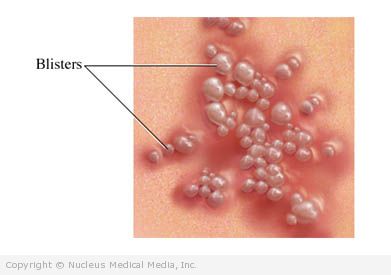Blisters – Definition
A blister is a fluid-filled bump on the skin.
Blisters – Causes
Causes of blisters include:
- Friction or constant pressure, such as from wearing a tight-fitting shoe or gripping a tool
- Second-degree burns, including sunburn
- Viral infections, such as chickenpox or shingles
- Fungal infections such as athlete’s foot
- Contact dermatitis, such as poison ivy or oak
- Allergic reactions, drug reactions, certain cancers, and inflammatory conditions
- Severe skin swelling, especially of the legs
Blisters – Risk Factors
A risk factor is something that increases your chance of getting a disease or condition.
Risk factors include:
- Wearing ill-fitting shoes
- Repetitive working with hand tools
- Getting a sunburn
Blisters – Symptoms
Symptoms may include:
- Fluid-filled bump on the skin, which is often round
Fluid is usually clear, but may be bloody
Blisters – Diagnosis
You can diagnose the presence of a blister by its appearance and by the activity you were doing when it appeared. Seek medical attention if the blister is unusually painful, appears infected, or is associated with a burn.
Blisters – Treatment
A blister will often heal without treatment. Some general tips for treatment include:
Protect the Area
- Be gentle with the injured area. To prevent further injury, put a bandage over the affected area. The blister should begin to shrink in about seven days.
- Do not pop or lance the blister. Opening the blister increases the chance of infection and delays healing.
- In the case of poison ivy or a viral infection, do not scratch the blister. If necessary call your doctor for medicine to relieve any itching or discomfort.
Wash the Area
If the blister is closed, wash the area with soap and water and apply a bandage to help protect it. If the blister is open, wash the area, apply an antibiotic ointment, and then cover with a sterile dressing or bandage.
See Your Doctor If:
A blister usually heals by itself. See your doctor if:
- The blister is unusually large (ie, bigger than a nickel)
- The blister is in a critical area, such as on the face or the groin
- The blister is associated with a burn
- There are signs of infection, such as increasing redness around the blister, red streaks, severe swelling, pus drainage, fever, or an increase in pain
Blisters – Prevention
To help prevent blisters:
- Wear shoes that fit properly.
- Always wear socks with your shoes.
- Use gloves or protective padding when working with tools.
- Wear a hat, protective clothing, and sunscreen when out in the sun.

